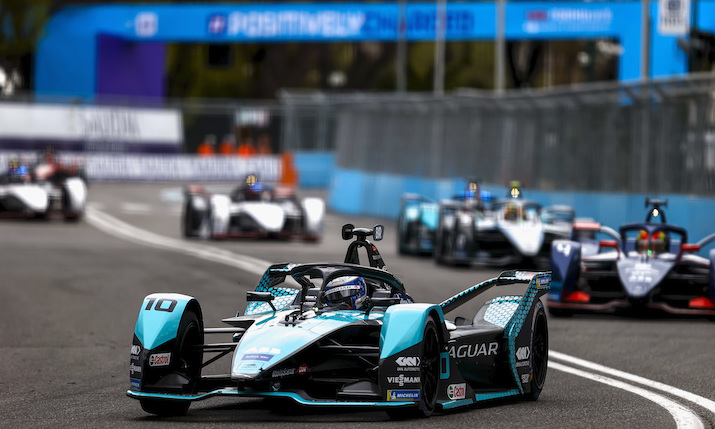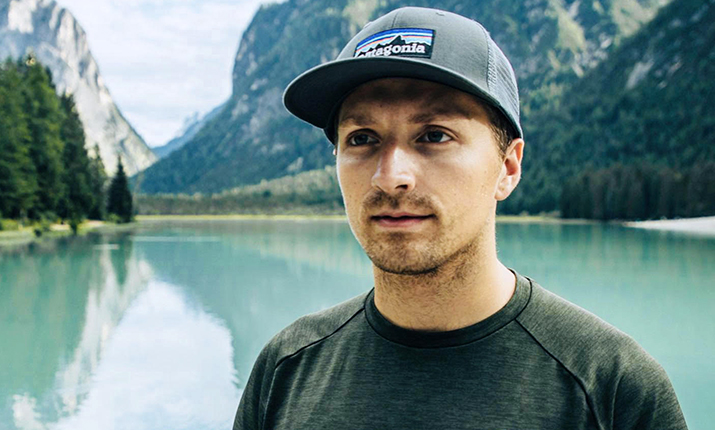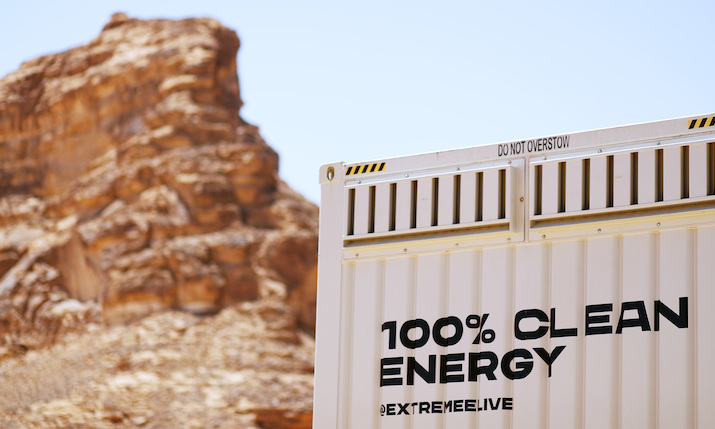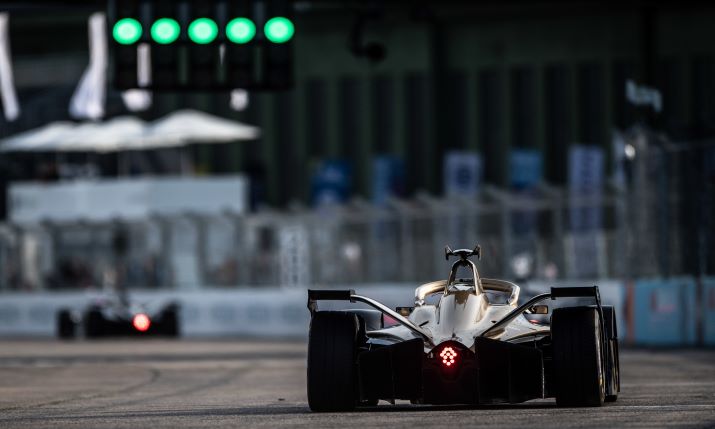Attack Mode: Little Dot Studios on developing a successful net-zero formula for sports production

Photo: Andy Hone/LAT Images. Courtesy of Formula E
“There is no industry that is taking [environmental sustainability] seriously enough. The industries that talk about it the most are the ones not doing enough. The media sector needs to be more aware of the role that it has both as a communicator but also operationally and logistically.”
Strong words from Saunders Carmichael-Brown, a creative producer, digital presenter and, crucially, sustainability ambassador at All3Media-owned content agency and media network Little Dot Studios.
His job is to lead the company’s drive to become a more responsible producer and distributor of sports content.
Speaking to SVG Europe earlier this month, he outlined the environmental sustainability efforts that the company has gone to so far, offered up some advice for others in similar situations, and detailed Little Dot’s plans for the future.
While he acknowledges that the wider industry needs to up its game, he and Little Dot are certainly doing their bit.
“Offsetting should always be the last resort. I am very aware. And I communicated it from the first meeting. Offsetting is plugging a hole. The priority is reduction.”
In February, the company was verified as carbon neutral to Future Net Zero (FNZ) standard across its organisational and operational output, making it one of the first production companies to achieve that status. Not only that, it has increased its offsetting efforts to account for its historical emissions going all the way back to the company’s inception in 2013.
Similarly, the company has signed onto the UN Sports For Climate Action Framework and is committed to using its voice in the sports sector to drive positive change and awareness on-screen as well as reduce emissions from its operations.
It also has strong links to sustainability-conscious sports, working with Formula E, Extreme E and most recently the eSkootr Championship. Which is no coincidence.
The company’s aim, or certainly Carmichael-Brown’s aim, is to become the ‘go to’ agency for electric and sustainability-conscious motorsport, and indeed other sports.

How did the company get to the position where they are recognised as a responsible agency? For Carmichael-Brown (pictured, above), it began quite small.
“The sustainability angle started out as interest about four or five years ago, and then the interest became a passion and then an obsession,” he says. “And then I needed to study it and know the facts around it, in order to have a bit more of a comprehensive understanding of what it actually means and what progress is.
“I was getting really frustrated with not being able to cut through greenwashing, for example, being manipulated and falling for the same traps.”
In response, he did an 18-month global impact science course with the University of Pennsylvania. This provided him with science-based targets and the background story of what climate change really is, how the weather works and, crucially, how this is affecting economics around the world.
“All I’ve been wanting to do since getting involved in this is find a way to make my impact greater and, if I can do that within a company [Little Dot], and one that is part of a new even bigger group [All3Media], it’s a win-win.”
It certainly dovetailed nicely with Little Dot CEO Dan Jones’ desire to establish a sustainability vision for the agency.
“Little Dot already had a really good social sustainability policy in terms of hiring and in terms of staff culture,” continues Carmichael-Brown. “So I was focused on sorting out the carbon impact.
“I spent about six months going around every different angle of the business, talking to different teams and finding out how their operations work and then from that assessing where the emissions were”
This included a wide variety of facets from office power, employee initiatives and ways of working, to how its productions are created and facilitated.
“Then it was about calculating that impact,” he continues. “I tried to do this myself for a long time but I realised that the way that this works in terms of hitting any achievement targets, such as accreditation or evaluation, you need third parties.
“They know the process, and you can save a lot of time and kind of streamline the process. So I got a third party involved [called Inteb] and they helped me get more accurate readings, and helped me to look at some things that I hadn’t thought about or hadn’t considered. Then we built an incredibly accurate emissions [report].

Extreme E: An AFC Energy container during the Desert X-Prix at AlUla in AlUla, Saudi Arabia
Photo by Sam Bloxham / LAT Images
“And from then it was about understanding, firstly, where the key impact areas were. Travel is huge. But because Little Dot Studios work is content and channel management and digital reappropriation of existing content, as well as production, it actually means the operational missions were far greater the production emissions.”
The first goal, therefore, was to achieve carbon neutrality. They scoped it out based on 2020.
“Working with this third party, we were able to achieve carbon neutrality for 2020 and when we had the figures back we had an understanding of the emissions and the month-by-month breakdown, so we knew how and where to make improvements for this year and next year and the years that followed.”
But, for Carmichael-Brown, that wasn’t enough. Which is where the idea for going back to the launch of the company came from.
“It didn’t feel like a big enough learning curve. I didn’t feel that we were holding ourselves accountable for the impact we had. We decided to get as much information as we could back from the start of Little Dot and historically look at our emissions and then try and become carbon neutral from inception.”
“We’ve actually had a look at some of the clients we represent and have started to ask: are these the sort of people, we want to work with us? And that’s a very delicate conversation.”
For historical emissions, all they can do is offset, of course. So carbon neutrality was achieved, from inception, based on the Future Net Zero (FNZ) Standard, verified by Inteb.
“This involved a lot of back and forth with FNZ to make sure that they were happy with the data and we could prove our data. That was the first achievement and then it’s now about setting out what it looks like going forward and other accreditations.”
Little Dot Studios uses BAFTA’s Albert to track and certify its larger production projects and AdGreen, the advertising industry’s equivalent to Albert in the sustainability space, for short-form digital content.
“Accreditations are great for business and for PR and cons, but ultimately we want the numbers that we report to be lower next time we report them,” he adds.
Likewise, there is more to do than just offsetting.
“We knew from the off, and I knew this from my studies, that being carbon neutral is a good thing to have but offsetting should always be the last resort. I am very aware. And I communicated it from the first meeting. Offsetting is plugging a hole. The priority is reduction.”

Courtesy of Formula E
Developing the right formula
Formula E is an environmentally responsible electric motorsport. But for Little Dot staff, it is also the project that involves the most travel. As such, it makes for an interesting case in point when it comes to reducing carbon emissions, as Carmichael-Brown details.
“When it came to doing our audit, most of the travel emissions were from the crew working on Formula E. What we’ve done to try and reduce that is put in a policy where we try and hire local staff and local freelancers, in terms of shooters and even directors. Sometimes, we feel like a local director knows the audience better anyway.
“We’ve changed the entire way that we look at getting people to and from shoots: now COVID is [less of an issue], there is a lot more shared transportation, we’ve switched to zero emissions taxi providers and ditched anyone that didn’t have a good sustainability policy.
“We have changed the catering process too by only providing ‘to order’ – so rather than having a whole tray of food, we only have what people actually need. And the suppliers use as little single-use plastic as possible.
“With travel, our Formula E team has been reduced in terms of who goes. A lot more is done remotely. Formula E was also the first net zero sport – and they factored in all of their suppliers. They offset all of our travel. I didn’t factor that into our own process though.
“A core team travels to all races, established by who is absolutely needed. It’s the minimum we can have on the circuit. Nobody travels business class. Our travel supplier offers us choices for lower emissions, using more efficient flight routes.”
Overcoming the doubters
Carmichael-Brown is fortunate to have a very supportive management team and company structure. Not all sustainability managers, leads or ambassadors are so lucky. So, what advice does he have for others in his situation? Firstly, get the message out.
“Early doors we had a big ‘town hall’ meeting with the entire company. I did a 15-minute presentation on the importance of business and the role that our industry plays in the bigger picture. I’m proud to say that the biggest reaction was: ‘I didn’t realise how much we can do’.”
And if there are still naysayers?
“There are three ways. The first is pure emotive talk about the role that business plays in the climate crisis and how you can do more with the company you work for than you can by changing every little bit of your lifestyle as an individual. Using numbers to illustrate that [helps].
“That approach obviously doesn’t always work for salespeople though because their primary job is profit. Then you use the argument of ‘well, in the long run, this is more profitable and here’s why’.
“And then, if that doesn’t work, you can say, for example, if you can find a way to be able to create net zero productions that’s something you can add back into your quote so the client covers the overheads. This can become part of the business model, so it doesn’t cost you any more of your budget.
“The third way is to say this: policies are changing so do it now so you get an easy life in the future”
Scaling up
The company is now putting into place a net zero strategy that will see the company reducing emissions on “pretty much every level.” And, if it’s successful, rolling it out to other All3Media companies.
“We’re starting with travel, as a big hitter,” says Carmichael-Brown. “Energy is being addressed. And the international team is being addressed. It’s all well and good as a UK company to say we’ll look at changing this, we will changes suppliers, but in the US, sometimes they’re locked into State round things they can’t control that. So it’s about looking at the options and making sure the reporting is up to scratch.
“We’ve got a really good relationship with the sustainability lead at [parent company] All3Media Aaron Mathews. We are flirting with the idea of using Little Dot as a guinea pig for other All3 companies so the impact that we can have can then be scalable to much bigger companies. That is a real passion for me. Knowing what we achieve doesn’t have to stay within the walls of Little Dot.”
The strategy, and this applies to the wider industry, even includes looking at who they want to do jobs for.
“We’ve actually had a look at some of the clients we represent and have started to ask: are these the sort of people we want to work with us? And that’s a very delicate conversation as every company has shareholders or directors. But I think it is essential.”
His call to arms, is pretty simple though.
“There needs to be a sway towards low impact production over new opportunity or profit. This needs to be factored into every thought. It’s no secret that it’s not being done quickly enough.
“There needs to be less talk about net zero by 2050 and more talk about what can we do right now. Can we afford to dent our profits significantly this year in order to be doing a more responsible job and have a chance to increase profits in years to come as we have a more sustainable operation? That is the question we need to ask.”
Saunders Carmichael-Brown is a judge on the SVG Europe Sports TV Awards 2022.
